
Politics
08:12, 05-Jul-2017
Chinese president elaborates on making the world a better place
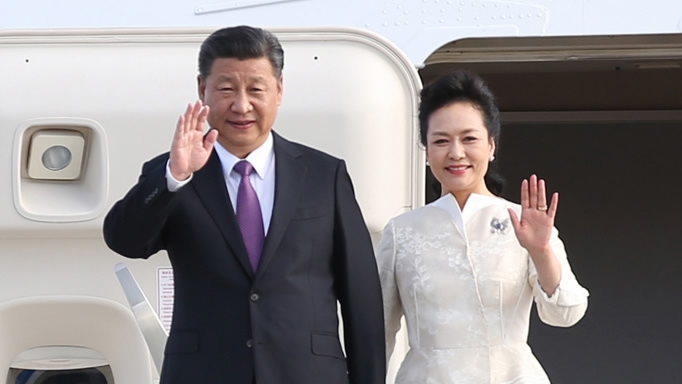
Chinese President Xi Jinping on Tuesday published a signed article titled "To make the world a better place" in mainstream German media Die Welt, ahead of his state visit to Germany, where he will also attend the upcoming summit of the Group of 20 (G20) major economies.
The following is the full text of the article:
To make the world a better place
Xi Jinping, president of the People's Republic of China
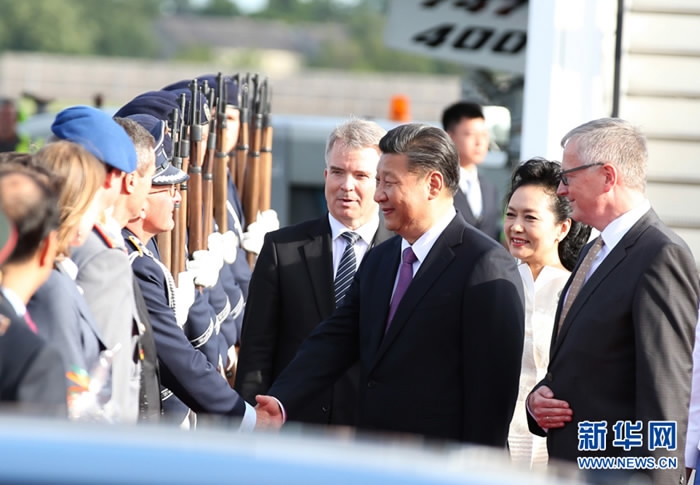
Chinese President Xi Jinping (R3) and his wife Peng Liyuan (R2) arrive in Berlin, Germany, July 4, 2017. /Xinhua Photo
Chinese President Xi Jinping (R3) and his wife Peng Liyuan (R2) arrive in Berlin, Germany, July 4, 2017. /Xinhua Photo
It gives me great pleasure to pay a state visit to Germany again and attend the G20 Hamburg Summit in the height of summer.
My visit coincides with the 45th anniversary of diplomatic ties between China and Germany. Forty-five years on, our two countries have seen smooth progress in bilateral ties and deepened practical cooperation across the board. During my first state visit to Germany in 2014, the two sides agreed to elevate our relationship to a comprehensive strategic partnership, opening a new chapter in the history of China-Germany relations.
– The strategic importance of China-Germany relationship continues to grow. Frequent exchanges of high-level visits have boosted mutual understanding and political mutual trust between our two countries. The Joint Program of Action on Cooperation: Shaping Innovation Together published in 2014 has become a master plan guiding the medium-to-long-term development of bilateral ties. The two sides have established the inter-governmental consultation as well as more than 70 other dialogue and cooperation mechanisms at various levels. In particular, the establishment of mechanisms such as the strategic dialogue on diplomacy and security, high level economic and financial dialogue, people-to-people dialogue, security dialogue and the economic advisory committee have added new dimensions to our comprehensive strategic partnership. Our cooperation has also been extended to areas such as space, ocean, the polar regions and cyberspace.
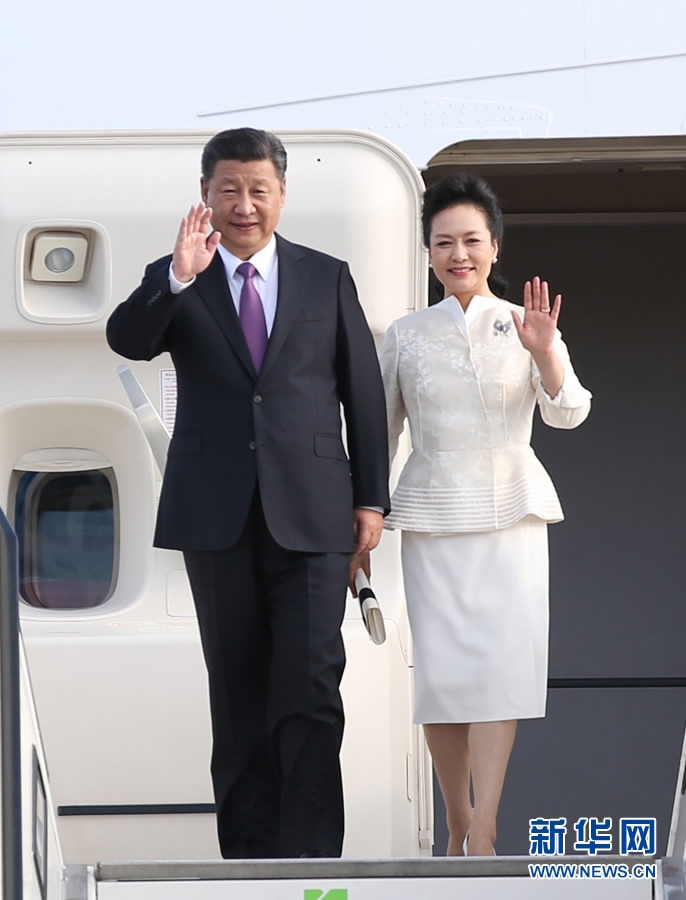
Chinese President Xi Jinping (L) and his wife Peng Liyuan (R) arrive in Berlin, Germany, July 4, 2017. /Xinhua Photo
Chinese President Xi Jinping (L) and his wife Peng Liyuan (R) arrive in Berlin, Germany, July 4, 2017. /Xinhua Photo
– China-Germany practical cooperation is yielding rich fruits. Germany has stayed as China's largest trading partner in Europe for 42 years in a row. According to German statistics, two-way trade reached 170 billion euros in 2016 and China became Germany's largest trading partner for the first time. Germany ranks the top among European countries in terms of technology transfer to China. As of May 2017, China signed with Germany a total of 76.82 billion dollars worth of technology transfer contracts. China-Germany investment cooperation has moved from a one-way street onto a two-way express lane. Cities such as Duisburg and Hamburg have become major hubs on the routes of China-Europe freight trains. Practical cooperation between China and Germany not only sets the pace for China-Europe relations, but also serves as a successful model of win-win cooperation between the world's most important economies.
– China-Germany cultural and people-to-people exchanges are flourishing. Since 2013, the two countries have successfully held major events ranging from the language year, the year of innovation partnership to the year of youth exchange. China has set up the China Culture Center, 19 Confucius institutes and four Confucius classrooms in Germany, while German institutes in China such as the Goethe-Institut and the Deutscher Akademischer Austauschdienst have also been actively engaged in cultural and people-to-people exchanges between the two sides. The 40,000 plus Chinese students studying in Germany make up Germany's largest group of international students, and there are over 30,000 German experts and 8,200 German students studying in China. More than two million people traveled between China and Germany in 2016. With 91 pairs of sister provinces/states and cities between us, our two countries also enjoy frequent and close exchanges at the subnational level. In November 2016, the two countries signed multiple agreements on football cooperation, marking new progress in this area.
Human society is undergoing great development, profound changes and major adjustments. The trends towards multi-polarity, economic globalization, application of information technologies in societies and cultural diversity have gained greater momentum. While mankind increasingly find ourselves in a community of shared future, we also live in a world fraught with challenges. Regional hotspots, the spread of terrorism, the deficits in peace, development and governance all pose grave challenges to the entire humanity.
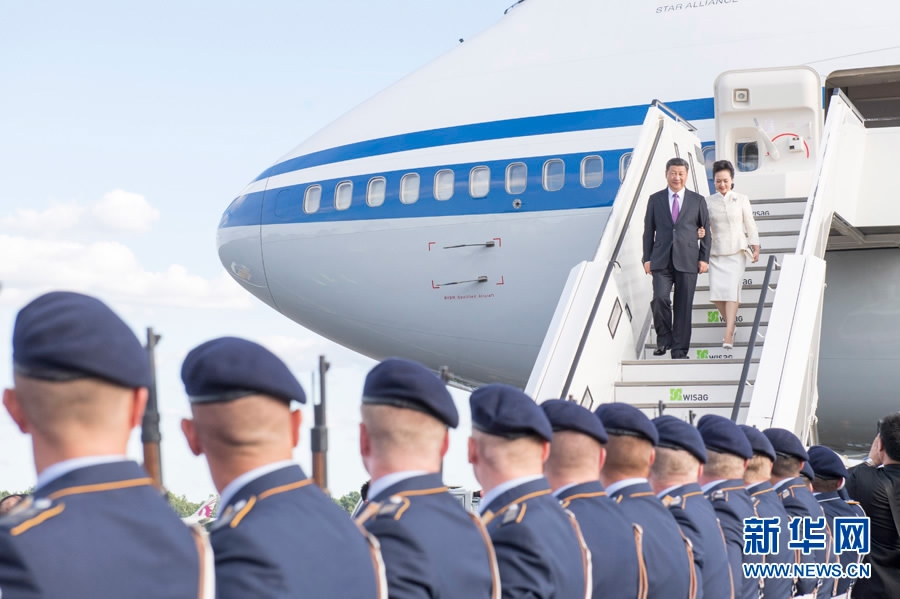
Chinese President Xi Jinping (L) and his wife Peng Liyuan (R) arrive in Berlin, Germany, July 4, 2017. /Xinhua Photo
Chinese President Xi Jinping (L) and his wife Peng Liyuan (R) arrive in Berlin, Germany, July 4, 2017. /Xinhua Photo
As the world's second and fourth largest economies and key trading nations with major influence, China and Germany, while pursuing our own development, also need to shoulder important responsibility of promoting regional and international peace, stability and prosperity.
An important task of my visit is to have in-depth discussions with President Frank-Walter Steinmeier, Chancellor Angela Merkel and other German leaders on how to seize the opportunities under the new circumstances to advance our comprehensive strategic partnership in a more coordinated manner with a view to elevating China-Germany relationship to a higher level.
We need to strengthen the top-level planning of our relations and draft the blueprint of its future growth with a more open mind and a broader vision. We need to let our dialogue mechanisms at different levels play a leading role and enhance strategic communication on bilateral relations and major international and regional issues. We need to properly handle differences through equal-footed dialogue and friendly consultation and give each other understanding and support on issues concerning our respective core interests and major concerns.
We need to enhance strategic synergy between "Made in China 2025" and Germany's "Industry 4.0" with a pioneering, innovative, open and inclusive approach, foster an investment environment of two-way openness and fair competition, deepen practical cooperation in such fields as innovation, the Internet, smart manufacturing, finance, energy, environmental protection and green development, and expand cooperation in third markets. We also need to step up cooperation within the "Belt and Road" framework and jointly contribute to security, stability and prosperity of countries along the routes.
We need to harness the coordination role of the High-Level People-to-People Exchange Dialogue Mechanism, deepen cooperation in education, culture, science and technology, tourism, health, think tanks, media, football and other fields, implement visa-related and other facilitation measures and bring our two peoples closer to each other. I am delighted that, during the visit, I will join Chancellor Angela Merkel at the opening of the Panda Garden at Zoo Berlin. I hope this pair of giant pandas who have already arrived in Berlin will serve as envoys of China-Germany friendship.
We need to step up our coordination and cooperation at the United Nations, the International Monetary Fund, the World Trade Organization, the Asian Infrastructure Investment Bank and other international organizations and institutions, commit ourselves to the betterment of international mechanisms and rules and make due contribution to upholding regional stability and world peace, promoting healthy growth of the world economy and forging a community of shared future for mankind.
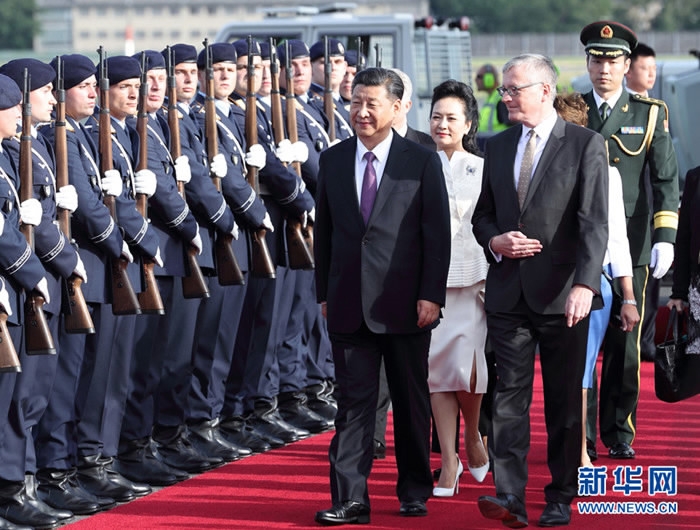
Chinese President Xi Jinping and his wife Peng Liyuan arrive in Berlin, Germany, July 4, 2017. /Xinhua Photo
Chinese President Xi Jinping and his wife Peng Liyuan arrive in Berlin, Germany, July 4, 2017. /Xinhua Photo
Last September, at the G20 Hangzhou Summit by the beautiful West Lake, China and other participants agreed on a number of innovative outcomes and made significant contribution to promoting strong, sustainable, balanced and inclusive growth of the world economy.
Despite further consolidation of growth momentum and the upbeat economic outlook in both the developed and emerging economies, daunting challenges still persist in the world economy. Against such a backdrop, it is all the more important that the G20, as the premier forum for international economic cooperation, continues to follow through on the consensus reached at Hangzhou and all its previous Summits and lead the way forward for the world economy. This serves the interest of all parties. China has great expectations for the Hamburg Summit and supports Germany in hosting a successful meeting.
– We look forward to a G20 that continues to uphold the spirit of partnership for win-win cooperation. For the G20, an important platform for equal-footed dialogue, communication and coordination among the world' s major economies, the spirit of partnership for win-win cooperation is its most critical asset. Such a spirit helped the G20 tide over the difficult times of the global financial crisis, and it is with this same spirit that the G20 will continue to lead the world economy forward. As long as countries stay true to our commitment to inclusiveness and mutual assistance, we will be able to forge ahead against all odds.
– We look forward to a G20 that continues to champion an open world economy. Economic globalization has provided strong impetus for world economic growth and facilitated the flow of goods and capital, progress in science, technology and civilization as well as people-to-people exchanges. That said, however, we must also address the problems that emerged in the process of economic globalization properly. The G20 needs to stay committed to open development, support the multilateral trading regime with the WTO at its heart and enable trade and investment to continue to drive global economic growth.
– We look forward to a G20 that continues to chart the course for innovative growth and long-term governance. The current growth momentum of the world economy has not come easily. New technologies and new forms of business have brought as many opportunities as challenges. To cement the growth momentum of the world economy, countries need to tap into new drivers of global growth through innovation, conduct fiscal and monetary policies and structural reforms in a coordinated manner, and promote strong, sustainable, balanced and inclusive growth of the world economy.
The successful Belt and Road Forum for International Cooperation recently held in Beijing is aimed at stepping up the synergy of development strategies and connectivity with relevant countries and regions in an effort to achieve interconnected development. It chimes with the theme of this year's Hamburg Summit- "Shaping an Interconnected World". The Belt and Road Initiative and G20 cooperation could complement and reinforce each other. China hopes to work with all parties at the Hamburg Summit to jointly send out a clear message on international economic cooperation and global economic governance and contribute to improved global growth and economic governance.
I look forward to working with Germany to advance the China-Germany comprehensive strategic partnership and contribute to the full success of the Hamburg Summit, for we share this common objective: to make the world a better place.
(Source: Xinhua)
7368km
Related story:

SITEMAP
Copyright © 2018 CGTN. Beijing ICP prepared NO.16065310-3
Copyright © 2018 CGTN. Beijing ICP prepared NO.16065310-3